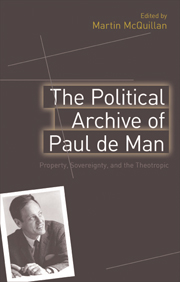Book contents
- Frontmatter
- Contents
- List of Abbreviations
- Acknowledgements
- Notes on Contributors
- Introduction: Broken Promises: Rousseau, de Man and Watergate
- 1 Lovence in Rousseau's Julie ou la Nouvelle Héloïse
- 2 Reading Spectacles in Rousseau's Letter to d'Alembert
- 3 The Utter Misery of the Human Mind: Apotropaic and Theotropic in de Man's Rousseau
- 4 Rhetoric and Rausch: de Man on Nietzsche on Value and Style
- 5 Theotropic Logology: J. Hillis Miller, Paul de Man and Kenneth Burke
- 6 Normativity, Materiality and Inequality: The Politics of the Letter in Paul de Man
- 7 Inscribing the Political: Paul de Man and the Wild Art of Letter Writing
- 8 Mistake in Paul de Man: Violent Reading and Theotropic Violence
- 9 Lightstruck: ‘Hegel on the Sublime’
- 10 De Man vs. ‘Deconstruction’: or, Who, Today, Speaks for the Anthropocene?
- 11 Paul de Man at Work: What Good is an Archive?
- 12 DNA: de Man's Nucleic Archive
- 13 Sovereign Debt Crisis: Paul de Man and the Privatization of Thought
- Appendix: Nietzsche I: Rhetoric + Metaphysics
- Index
12 - DNA: de Man's Nucleic Archive
Published online by Cambridge University Press: 05 August 2013
- Frontmatter
- Contents
- List of Abbreviations
- Acknowledgements
- Notes on Contributors
- Introduction: Broken Promises: Rousseau, de Man and Watergate
- 1 Lovence in Rousseau's Julie ou la Nouvelle Héloïse
- 2 Reading Spectacles in Rousseau's Letter to d'Alembert
- 3 The Utter Misery of the Human Mind: Apotropaic and Theotropic in de Man's Rousseau
- 4 Rhetoric and Rausch: de Man on Nietzsche on Value and Style
- 5 Theotropic Logology: J. Hillis Miller, Paul de Man and Kenneth Burke
- 6 Normativity, Materiality and Inequality: The Politics of the Letter in Paul de Man
- 7 Inscribing the Political: Paul de Man and the Wild Art of Letter Writing
- 8 Mistake in Paul de Man: Violent Reading and Theotropic Violence
- 9 Lightstruck: ‘Hegel on the Sublime’
- 10 De Man vs. ‘Deconstruction’: or, Who, Today, Speaks for the Anthropocene?
- 11 Paul de Man at Work: What Good is an Archive?
- 12 DNA: de Man's Nucleic Archive
- 13 Sovereign Debt Crisis: Paul de Man and the Privatization of Thought
- Appendix: Nietzsche I: Rhetoric + Metaphysics
- Index
Summary
In the winter of 2008 (and here already the problem begins with this narrative mode), I began postdoctoral research with Martin McQuillan on the Paul de Man Papers housed at UCI's Special Collections and Archives. Despite having spent years writing a lengthy dissertation on de Man and Heidegger, I had successfully managed to avoid a trip up to the fifth floor archive at Langson Library. My first task from Martin, however (and that would be Martin McQuillan not Martin Heidegger), was to take a look at what was then being called de Man's long Rousseau manuscript, and transcribe it. There were hopes that this handwritten manuscript was an unpublished work, and indeed it had been placed in a section of the Paul de Man Papers called ‘Unpublished Materials’. Without even noticing, I had already fallen into the archival trap: i.e., the work of hermeneutic unearthing, uncovering and unburying – already in itself grounded in problematic assumptions concerning truth and reading, but also quickly leading to ideological cover-ups, grave robbing and pious re-burials. And the magic burial dust for these purposes was there not to serve the dead, nor even the living, but for us, the zombies. As it turns out, zombies – those who cannot speak and have no inner rational consciousness or will – make the best transcribers. The hypomnesic writings of copyists tell us that the radical exteriority of inscription is either all archive or is no archive at all.
- Type
- Chapter
- Information
- The Political Archive of Paul de ManProperty, Sovereignty and the Theotropic, pp. 157 - 166Publisher: Edinburgh University PressPrint publication year: 2012



